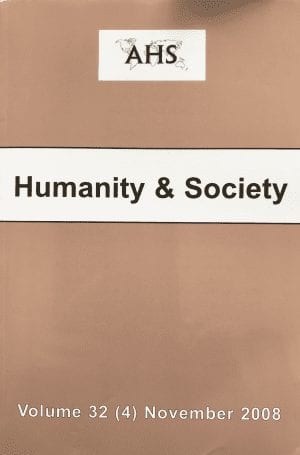 “I Change Myself, I Change the World”: Gloria Anzaldúa’s Sociological Imagination in Borderlands/La Frontera: The New Mestiza
“I Change Myself, I Change the World”: Gloria Anzaldúa’s Sociological Imagination in Borderlands/La Frontera: The New Mestiza
Mohammad H. Tamdgidi published the refereed article titled “‘I Change Myself, I Change the World’: Gloria Anzaldúa’s Sociological Imagination in Borderlands/La Frontera: The New Mestiza,” in Humanity & Society, vol. 32, issue 4, 2008:311-335.
What lessons can sociologists draw from the life and writings of the Chicana cultural theorist and spiritual activist Gloria E. Anzaldúa for advancing the sociological imagination and intellectual agenda that make a public difference? In this article Tamdgidi argues that the key to Anzaldúa’s public impact has to be sought in her thesis of the simultaneity of self and global transformations, and the intricate strategies she employed in advancing the thesis through her writings such as Borderlands/La Frontera: The New Mestiza (1987). Closely reading the text, Tamdgidi notes how for Anzaldúa the transformation of self/world essentially involves the task of bridging/transcending/healing a vast array of habitual dualisms deeply ingrained in our personal and global landscapes. Progressively unpacking Anzaldúa’s sociological imagination in order to highlight its potential contributions to enriching the Millsian and symbolic interactionist traditions in sociology, the author tries to provide a plausible answer to the question of what is so publicly transformative and energizing in Anzaldúa’s often privately focused, reflexive writings. He argues that it is the dialectic of public and private sociology informing her sociological imagination that renders her intellectual work so effective. Amid current debates on ways to advance public sociology, Anzaldúa’s way of going private to advance public sociology is paradoxically effective and refreshing.
It seems counter-intuitive to consider that the more effective public sociologies may be those that seriously engage the most personal and private recesses and troubles of our human lives. However, this is what Gloria Anzaldúa’s life and work illustrates well. It is also what is at the heart of humanist sociology—being mindful of both the trees and the forest of human social experience, and the link between the private and the public. Cultivating this link is the promise of C. Wright Mills’s “sociological imagination,” one that can and should be comparatively enriched drawing upon insights from “non-sociologists” from “other” cultural traditions as well. Disciplinary identities and affiliations may continue to prevent us from hearing Anzaldúa’s voice simply because she was not a “sociologist”; however, she represents subaltern voices that differently challenge us to rethink in new ways the habitual, dualistic structures of knowledge prevailing in sociology about “self and society.” It is one thing to study “the self” or others’ selves; it is another to study oneself, and do so very seriously. Anzaldúa’s courage in advancing public sociology by sharing her private self-examinations opens new windows to re-imagine the sociological imagination across disciplinary and cultural borderlands.
This journal article can be accessed here. The journal issue as part of which the article was published can be accessed here.


